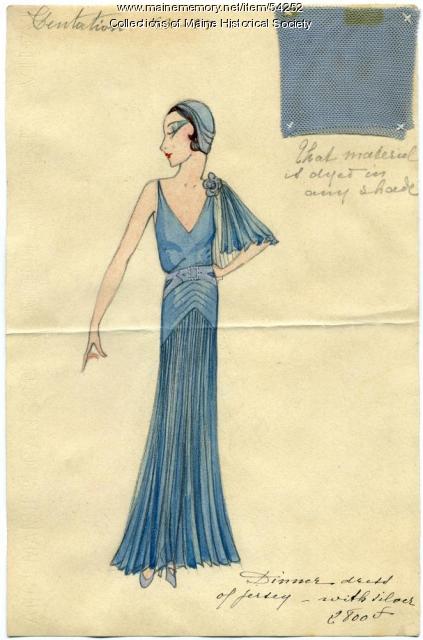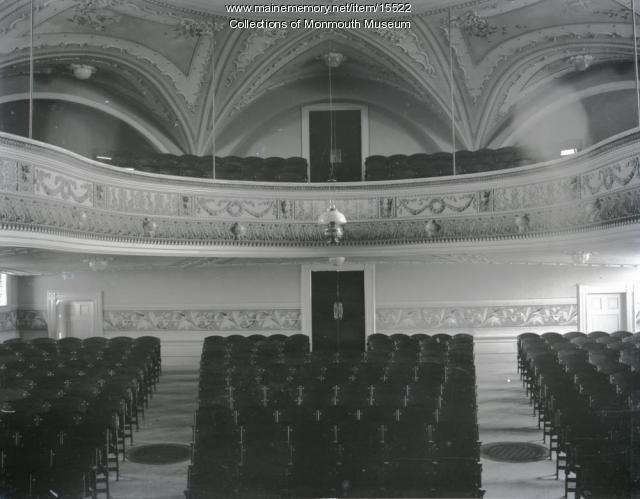Keywords: traveling shows
- Historical Items (80)
- Tax Records (0)
- Architecture & Landscape (0)
- Online Exhibits (74)
- Site Pages (43)
- My Maine Stories (9)
- Lesson Plans (0)
Online Exhibits
Your results include these online exhibits. You also can view all of the site's exhibits, view a timeline of selected events in Maine History, and learn how to create your own exhibit. See featured exhibits or create your own exhibit
Exhibit
The Schooner Bowdoin: Ninety Years of Seagoing History
After traveling to the Arctic with Robert E. Peary, Donald B. MacMillan (1874-1970), an explorer, researcher, and lecturer, helped design his own vessel for Arctic exploration, the schooner <em>Bowdoin,</em> which he named after his alma mater. The schooner remains on the seas.
Exhibit
Home Ties: Sebago During the Civil War
Letters to and from Sebago soldiers who served in the Civil War show concern on both sides about farms and other issues at home as well as concern from the home front about soldiers' well-being.
Exhibit
Summer Folk: The Postcard View
Vacationers, "rusticators," or tourists began flooding into Maine in the last quarter of the 19th century. Many arrived by train or steamer. Eventually, automobiles expanded and changed the tourist trade, and some vacationers bought their own "cottages."
Exhibit
Samantha Smith, a Manchester schoolgirl, gained international fame in 1983 by asking Soviet leader Yuri Andropov whether he intended to start a nuclear war and then visiting the Soviet Union to be reassured that no one there wanted war.
Exhibit
History in Motion: The Era of the Electric Railways
Street railways, whether horse-drawn or electric, required the building of trestles and tracks. The new form of transportation aided industry, workers, vacationers, and other travelers.
Exhibit
Maine Streets: The Postcard View
Photographers from the Eastern Illustrating and Publishing Co. of Belfast traveled throughout the state, especially in small communities, taking images for postcards. Many of these images, taken in the first three decades of the twentieth century, capture Main Streets on the brink of modernity.
Exhibit
Sagadahoc County through the Eastern Eye
The Eastern Illustrating and Publishing Company of Belfast, Maine. employed photographers who traveled by company vehicle through New England each summer, taking pictures of towns and cities, vacation spots and tourist attractions, working waterfronts and local industries, and other subjects postcard recipients might enjoy. The cards were printed by the millions in Belfast into the 1940s.
Exhibit
Cosmopolitan stylings of Mildred and Madeleine Burrage
Born in Portland, sisters Mildred Giddings Burrage (1890-1983) and Madeleine Burrage (1891-1976) were renowned artists and world travelers. Mildred's experiences studying painting in Paris and Italy, and the sisters' trips to Mexico and Guatemala inspired their artwork and shared passions for cosmopolitan and stylish attire. Housed at Maine Historical Society, The Burrage Papers include selections of original advertising drawings called "line sheets" from Parisian fashion houses dating from 1928 to 1936. Images of Madeleine's gemstone jewelry and Mildred's artwork accompany intimate family photographs of the sisters.
Exhibit
Passamaquoddy Indians from Washington County traveled to Portland in 1920 to take part in the Maine Centennial Exposition. They set up an "Indian Village" at Deering Oaks Park.
Exhibit
For one hundred years, Acadia National Park has captured the American imagination and stood as the most recognizable symbol of Maine’s important natural history and identity. This exhibit highlights Maine Memory content relating to Acadia and Mount Desert Island.
Exhibit
Sylvan Site: A Model Development
Frederick Wheeler Hinckley, a Portland lawyer and politician, had grand visions of a 200-home development when he began the Sylvan Site in South Portland in 1917. The stock market crash in 1929 put a halt to his plans, but by then he had built 37, no two of which were alike.
Exhibit
Music in Maine - Radio Cowboys and Country Music
"… on the Radio' show in 1938, WGAN’s ‘Ken MacKenzie Show’ in 1939, and Hal Lone Pine’s show on WABI in Bangor—which in 1938 was the first ever…"
Exhibit
Named for the two largest things in Maine at the turn of the 20th century, Mt. Katahdin and Granger of Stetson, were known as the Largest Oxen in the World. Unable to do farm work because of their size, they visited fairs and agricultural events around the Northeast.
Exhibit
Construction of the Bangor and Aroostook rail lines into northern Aroostook County in the early twentieth century opened the region to tourism and commerce from the south.
Exhibit
"… the 19th and 20th centuries, Wabanaki musicians traveled worldwide showcasing their talents and performing in operas, vaudeville, and so-called…"
Exhibit
"… the late 1920s to early 1950s news, variety shows, game shows, and popular music drew millions of listeners."
Exhibit
Promoting Rockland Through a Stereopticon, 1875
Frank Crockett and photographer J.P. Armbrust took stereo views of Rockland's downtown, industry, and notable homes in the 1870s as a way to promote tourism to the town.
Exhibit
Christmas, a Christian holiday observed by many Mainers, has a very public, seasonal face that makes it visible to those of all beliefs.
Exhibit
After the canoe, steamboats became the favored method of transportation on Moosehead Lake. They revolutionized movement of logs and helped promote tourism in the region.
Exhibit
The boundaries of Maine are the product of international conflict, economic competition, political fights, and contested development. The boundaries are expressions of human values; people determined the shape of Maine.
Exhibit
Remembering Mellie Dunham: Snowshoe Maker and Fiddler
Alanson Mellen "Mellie" Dunham and his wife Emma "Gram" Dunham were well-known musicians throughout Maine and the nation in the early decades of the 20th century. Mellie Dunham also received fame as a snowshoe maker.
Exhibit
Music in Maine - Opera, Orchestras and Stages
"… Poolaw, from the Kiowa Tribe of Oklahoma, while traveling across the country performing as “Indians” at wild west shows and on the theater circuit."
Exhibit
The Advent of Green Acre, A Baha'i Center of Learning
The Green Acre Baha'i School began as Green Acre Conferences, established by Sarah Jane Farmer in Eliot. She later became part of the Baha'i Faith and hosted speakers and programs that promoted peace. In 1912, the leader of the Baha'i Faith, 'Abdu'l-Baha, visited Green Acre, where hundreds saw him speak.
Exhibit
Northern Threads: Civil War-era clothing
An exhibit vignette within "Northern Threads, Part 1," featuring American Civil War civilian and military clothing, 1860 to 1869.
























